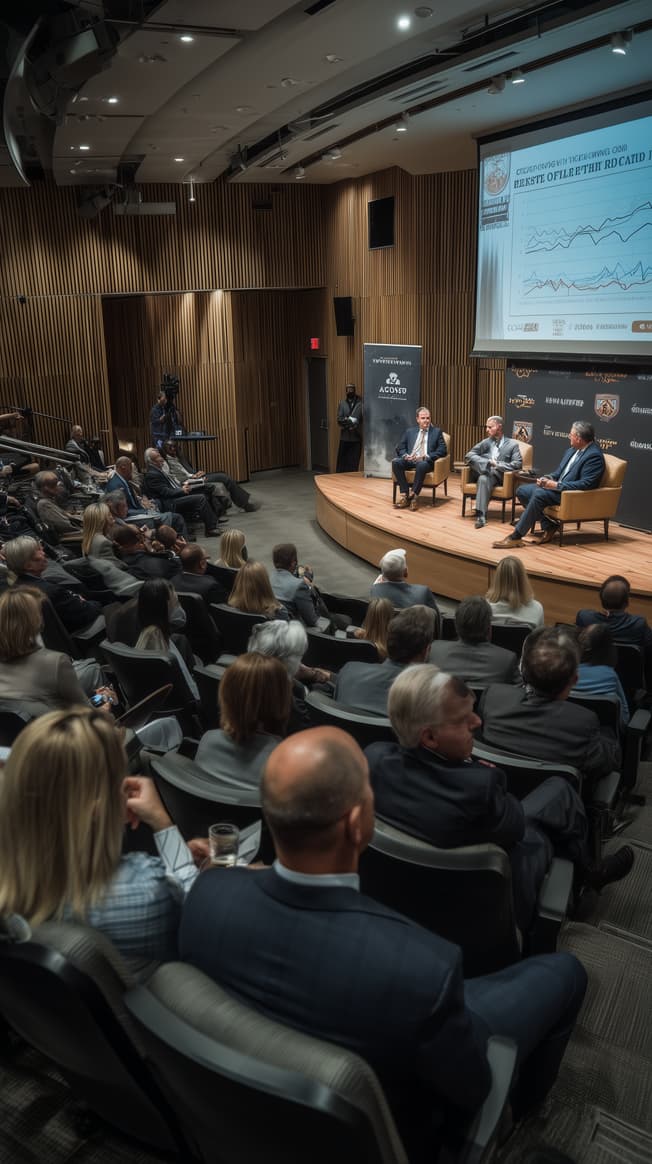In an increasingly complex global economy, businesses—particularly small and medium-sized enterprises (SMEs)—are often focused on internal operations, customer engagement, and market strategy. But one crucial opportunity frequently overlooked is participation in public economic hearings and forums.
These events, organized by government agencies, economic development groups, or industry associations, serve as platforms for discussing policies, regulations, and economic trends that directly impact businesses. Whether it’s a local city council evaluating tax changes, a regional economic forum exploring labor trends, or a national panel on trade policy, engaging in such dialogues allows businesses to be more than passive recipients of regulation—they become active participants in shaping the economic environment.
So why should businesses invest time and resources into these forums? Let’s break down the strategic, operational, and reputational benefits.
Understanding the Economic Landscape
Public economic hearings provide direct insight into the economic forces and regulatory plans that can affect industries and local markets. Businesses that attend these sessions gain early awareness of:
- Proposed tax policies or zoning laws
- Infrastructure investments or transportation projects
- Environmental and labor regulations
- Trade and tariff updates
- Workforce development programs
Being informed early enables companies to anticipate changes, adjust their strategy, and make more resilient business decisions.
Influencing Policy Before It’s Finalized
Perhaps the most powerful reason to attend public economic forums is the opportunity to influence decisions before they are implemented. These platforms often include open comment periods where business owners and stakeholders can:
- Express support or concern over proposed measures
- Share on-the-ground data and real-world case studies
- Advocate for their industry’s needs
- Suggest practical alternatives to proposed regulations
In many cases, lawmakers and economic planners are not business operators. They rely on the voices of the business community to understand how policies will function in reality. A well-informed business leader can steer the direction of a new policy or help prevent unintended negative consequences.
Building Relationships with Decision Makers
Economic forums attract key figures in policy, planning, and investment— including local officials, regulators, and leaders of development initiatives. For business owners, this is a rare opportunity to:
- Build relationships with policymakers
- Gain visibility within regional economic circles
- Position their business as a community stakeholder
- Be considered for pilot programs or public-private partnerships
These relationships can translate into opportunities for funding, expansion, or influence that would otherwise be inaccessible through traditional networking channels.
Gaining a Competitive Edge
Businesses that are engaged in policy discussions are often better prepared for what’s ahead. While competitors may be caught off guard by a new tax regulation or compliance requirement, engaged companies will have already started adapting.
Additionally, companies that understand and shape emerging trends—like green energy incentives, workforce re-skilling, or digital infrastructure investments—can align their strategies early and stand out in the market.
This foresight doesn’t just reduce risk—it creates opportunity.
Enhancing Brand Credibility and Reputation
Participating in public hearings and economic forums signals to customers, partners, and the broader community that a business is informed, responsible, and future-focused. This reputation can enhance trust and credibility, especially in industries where community or environmental impact matters.
For example:
- A construction firm speaking at a local zoning meeting demonstrates its commitment to sustainable development
- A tech startup that attends a regional innovation summit may be seen as a forward-thinking leader in its field
- A retail business advocating for local workforce training shows its investment in community wellbeing
In this way, public engagement becomes a part of a company’s brand narrative—and one that resonates with modern, socially-conscious audiences.
Learning from Other Stakeholders
Public economic forums are not just about government and business. They often include educators, non-profits, environmental groups, labor unions, and citizen advocates. Engaging with this diverse ecosystem helps businesses:
- Understand multiple perspectives
- Discover partnership opportunities
- Identify shared goals with other community players
- Improve their social and environmental responsibility strategy
This cross-sector exchange enriches a company’s worldview and helps design more inclusive and sustainable business practices.
Practical Tips for Getting Involved
If your business is new to the world of economic hearings and forums, here are some actionable steps to begin:
- Follow local and regional economic development agencies on social media or sign up for their newsletters
- Join a chamber of commerce or business association, which often receives early information about upcoming events
- Monitor public notice boards for hearings about tax, zoning, or industry regulation
- Nominate a representative from your team to regularly attend relevant meetings or webinars
- Prepare comments in advance—well-researched, professional input makes a strong impression
- Collaborate with other businesses to present a united industry position when necessary
Start small, but stay consistent. Even attending two or three forums a year can expand your business’s influence and insight significantly.
Common Misconceptions
Many businesses believe that public economic hearings are only for large corporations or political organizations. In reality:
- SMEs often have more at stake, as they are more sensitive to policy shifts
- Public input is actively encouraged, especially from diverse voices
- Your local insights are valuable—you don’t need to be a policy expert
It’s not about dominating the discussion. It’s about being at the table when decisions that affect you are being made.
Conclusion
In a time of rapid economic change, policy uncertainty, and social transformation, businesses can no longer afford to be passive. Public economic hearings and forums offer a rare and powerful opportunity to stay informed, shape the conversation, and build meaningful relationships with the people and institutions shaping the future.
Whether you are a local café owner, a mid-sized manufacturer, or a tech entrepreneur, your voice matters—and your participation can make a real difference, not just for your business, but for your entire community.
Now is the time to engage. Don’t just adapt to the economy—help build it.
